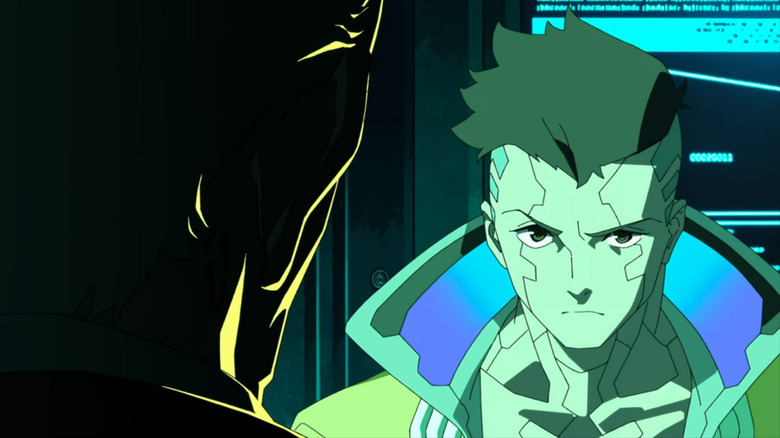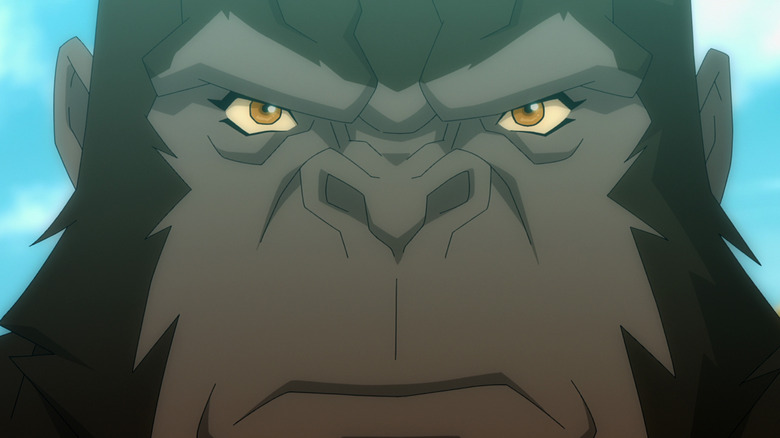Is Netflix's Skull Island An Anime? What We Know About Powerhouse Animation's Style
The eternal question: Is it anime, or is it just better than we expect from Western animation? The debate has risen up again in the case of "Skull Island," the new Netflix series that's part of Legendary Pictures' MonsterVerse franchise. As fans await the release of "Godzilla x Kong: The New Empire" in 2024, they can stay involved in the kaiju (sorry, Titan) saga with the latest foray into King Kong's tropical home. But is "Skull Island" anime or not?
The short answer is no. "Skull Island" is produced by Powerhouse Animation Studios — a company responsible for past Netflix hits like "Castlevania," "Masters of the Universe: Revelation," and "Blood of Zeus." If you've seen any of those shows, you'll know that they take tons of visual inspiration from anime series like "Full Metal Alchemist" and "Attack on Titan." from the character designs to the way the action sequences are choreographed, these shows have clear anime DNA. However, Powerhouse is a fully American company primarily based in Austin, Texas and Burbank, California. By the traditional definition, anime only refers to material made in Japan.
The folks at Powerhouse have never hidden their love of anime, and they've spoken about it openly on numerous occasions. "Castlevania" in particular was drawn to resemble Japanese shows because the video games it's based on are Japanese themselves. Today, the discourse around what does and does not constitute true anime has gotten a bit fuzzy, and as Western studios like Powerhouse keep creating great work, the line will likely only continue to blur.
What does anime mean in 2023?
Should anime still only be a term applied to movies and shows created in Japan? Powerhouse Animation's own Sam Deats addressed that question in a Kotaku interview about "Castlevania" in 2017. "There's always the debate about whether a studio in the US that's anime-influenced is, in itself, anime," Deats said "And I'll let other people decide. But the artists and animators here, obviously being heavily influenced by anime, it was easy for us to inject that look and feel into the show." Deats explained that for certain projects, Powerhouse will also work closely with international studios like South Korea's MOI Animation to help get the details right. But then the question rears its head again: Does Korean animation even count as anime?
While these debates will surely linger for years, they seem to be less and less important. That's partially due to the explosion in Western animation that's taken place over the past decade or so. Historically, animation in the United States was reserved for cartoons, children's films, and the occasional adult comedy like "The Simpsons" or "South Park." But in the modern streaming age, shows like "Castlevania" and "Skull Island" have dramatically expanded what "Western" animation looks like.
Things get even more complicated with a show like "Cyberpunk: Edgerunners," which was produced in Japan by Studio Trigger but made in conjunction with Polish video game developer CD Projekt and released as a brief, eight-episode Netflix original series. Drawing the line, so to speak, has never been more complicated.
Does a label like anime truly matter anymore?
From "Avatar: The Last Airbender" to "Skull Island" and beyond, the "Is it anime?" debate has been going on for decades. But as the field of animation continues to blend across both genre and international borders, is such a label even useful anymore? Obviously, the answer is yes, but maybe not in the way that some would think.
There will always be a necessary value in paying tribute to Japanese animation. The whole style that we associate with anime goes back to manga, or Japanese graphic novels, which eventually transferred over to the screen. For decades, animation houses like Studio Ghibli and Bandai Namco led the charge on innovative storytelling in the medium, blowing almost all international competition out of the water. And in many ways, that trend continues today. American studios like Powerhouse do what they do because they've been inspired by the Japanese tradition of animation, and therefore, they maintain a respectful distance and deference, as they should.
The term "anime" will never be fully dislodged from its Japanese heritage, nor should it be. But as more and more foreign studios leave their own mark on the industry, things will inevitably continue to change. So is "Skull Island" anime? Technically, still no. But depending on who you ask, that might not really matter all that much.


